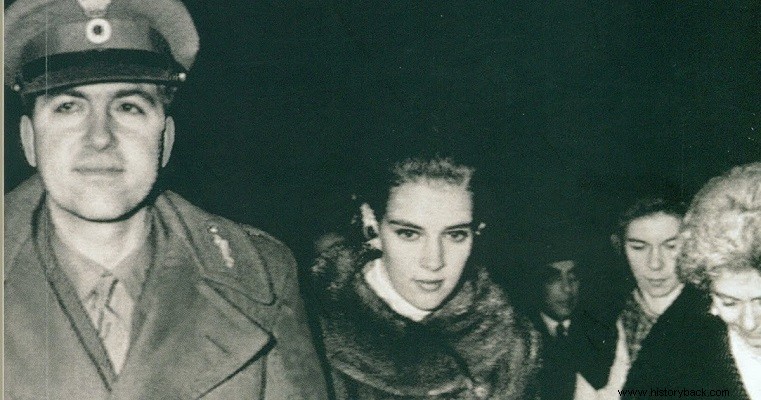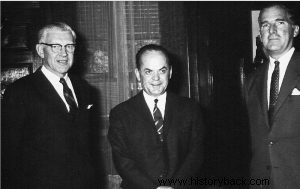
The telegrams of the American ambassador in Athens, Philip Talbot, to the State Department had as a key point of reference, as early as the beginning of December 1967, the impending conflict between the king and the junta. "Twice in the past few days Constantine expressed to me his concern about the junta's intentions," Talbot said. "On November 30, he told me in one moment that he was afraid that the junta could, that night, arrest Defense Minister Spantidakis and Generals Kollias and Peridis".
On 13 December 1967, before the Royalist counter-movement took place, Talbot sent a signal to NATO headquarters. In it he mentioned that the king called him to Tatoi and announced to him that he intended to move, that very day, against the Junta. He would go, together with his family and close associates to Kavala, where loyal to him, as he believed, soldiers would be waiting for him. From there he would call on the armed forces to support him and demand the resignation of the junta government.
The king asked Talbot to allow instructions to be channeled through American channels to ministers Pipinelis and Spantidakis, instructing them to support his move diplomatically, in NATO. The king told Talbot that he would be grateful if the President and the US government supported his movement, which aimed to return to constitutional normality.
Constantine also asked the Americans to use all their influence in order to convince the junta that it should not resist, leading the country into civil conflict. Talbot, however, gave rather little chance of prevailing in the royal counter-movement, That is why he denied the use of the American channels of communication to the king, "at least until it becomes clear that his movement has a serious chance of success".
However, he allowed communication with Spantidakis and Pipinelis. But it was obvious that the US would not take sides in the intra-Greek conflict, at least not before it was clear where the tide was going. This move by Talbot had nothing to do with his personal beliefs, but with serving American interests in Greece. In any case, however, he served the Junta who controlled the situation.
He appealed, as he claims, to the State Department to strengthen the royal faction . Only after the unfortunate end of the anti-movement, he necessarily reported to Washington that there is no longer an alternative to the junta, but at the same time, again stating his objections to the American tolerance of the regime.
At noon on December 13, Philip Talbot sent a report to the State Department. In it, he talked about the reaction of the junta to the royal move, that Papadopoulos believed, like Constantine, that he wanted to make a "revolution". The American ambassador, apparently following orders from Washington, assured the Juntas that the US was not going to intervene on behalf of one side or the other.
The goal of the US, he said, was to avoid bloodshed in Greece. And on the fateful day, December 13, Talbot did what he could to convince his superiors in Washington to take a stand in favor of the king and against the Junta. In order to convince his superiors, he did not hesitate to emphasize the danger of communism.
"I would like to say that the US as an ally and friend of Greece does not interfere in internal affairs, but, as the recent Cyprus crisis has shown again, war in this region of the world can only end with gains for the communists." he was writing his new report.
"Whatever we may think of the King's wisdom in making this move today, our interests now depend on his success, since his eventual failure would not only overthrow the monarchy, but stabilize the military Junta in Greece for in the coming years". , he concluded.
Talbot went so far as to ask Papadopoulos to negotiate with the king. In the meantime, the State Department was influenced by the ambassador's report on the communist danger, but forbade him to proceed with a mediation initiative between the king and the junta.
On the morning of December 13, in Talbot's new contact with the State Department and while the situation has not been clarified in favor of one side or the other, the ambassador brought up the issue of the US declaring Houda Papadopoulos as a seditious and to throw the weight in favor of the king. However, in the afternoon of the same day, the junta announced the impeachment of the king and his replacement by general Georgios Zoitakis as regent.
"My feeling is that instead of passively waiting for the events, we will do well to stand firmly on the side of the king, from the time we make sure that he has the support of the majority of the Greek armed forces. So far we have no information on the situation in northern Greece, nor if the king has re-established contact with the Greek people or the US. We await your instructions' , Talbot reported to his superiors.
But the answer he received disappointed him completely. The State Department ordered a tough stance in favor of the Junta , closing the matter and ignoring Talbot's pleas. Papadopoulos, meanwhile, was in constant communication with Talbot. On the morning of December 14, Papadopoulos called the American ambassador and asked him about the developments.
Talbot responded sibylically, saying that if the conflict with the king continued, the US was determined to preserve what it had achieved so far. Talbot, however, told Papadopoulos that he would convey the same message to the king and appealed for the start of negotiations.
Papadopoulos said that upon his departure the king refused to exercise his duties as monarch and consequently, according to the Constitution, which he suddenly remembered, the government installed a regent in his place.
Talbot replied that it was very difficult to convince the American government and accept Papadopoulos' excuse, since the king was still in Greece and acting according to the Constitution. Talbot also did not hesitate to repeat to Papadopoulos the mandate of their government, that civil strife in Greece should be avoided at all costs.
St. responded to these movements of Talbot and the Americans. Pattakos, who laid the blame on the royal side. Talbot replied that the US did not wish to blame anyone, but to prevent "a tragedy". Then Papadopoulos intervened and declared that he himself controlled the Army and dominated the royals. So there was no reason to negotiate. Talbot again attempted to overemphasize US "concerns" about the situation in Greece, but it was too late.
In fact the junta was alarmed by the explosion of the anti-royalist movement. However it soon became apparent that the king's movement suffered both from a lack of organization and from a complete lack of information about the loyalty of particular officers to the Crown. So the movement died out soon and almost bloodlessly. The royalist high officers were arrested and the king, with his family, left for Italy to avoid arrest. Everything had been decided.
Talbot now, in his new report, no longer had an alternative solution, nor an immediate possibility of replacing Junta Papadopoulos. He even made the "prophetic" prediction that now "since Huda has not fallen, he has no reason to rush to leave. Regime leaders may intensify the repression, as they now have no reason to be sensitive about anyone else's opinion.” , Talbot's report concluded.
Talbot, however, remained in contact with Constantine, who asked him to mediate with the US government so that it would not recognize the Junta "government". The king also asked for US assistance in holding a referendum in favor of his return to Greece. Talbot did not disagree and instructed embassy staff to leak that :“…in the event that the US recognizes the military government, please reply that no decision has been made until the status of the king is clarified.
"You must leave no doubt about the fact that for us the main problem is the undemocratic nature of the regime..." , his directive concluded. But Papadopoulos moved more immediately. On January 6, 1968, he sent a personal letter to American President Lyndon Johnson, in which he wrote that the junta "prevented civil war in the country"...

US Ambassador Talbot (left), Papadopoulos and US Assistant Secretary of State Rockwell.
